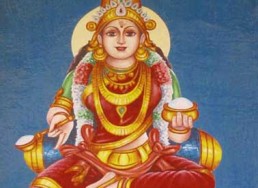Annapurna Stotram
निर्धूताखिलघोरपावनकरी प्रत्यक्षमाहेश्वरी ।
प्रालेयाचलवंशपावनकरी काशीपुराधीश्वरी
भिक्षां देहि कृपावलम्बनकरी माताऽन्नपूर्णेश्वरी ॥ १॥
nirdhūtākhilaghorapāvanakarī pratyakṣamāheśvarī .
prāleyācalavaṃśapāvanakarī kāśīpurādhīśvarī
bhikṣāṃ dehi kṛpāvalambanakarī mātā’nnapūrṇeśvarī .. 1..
मुक्ताहारविलम्बमान विलसत् वक्षोजकुम्भान्तरी ।
काश्मीरागरुवासिता रुचिकरी काशीपुराधीश्वरी
भिक्षां देहि कृपावलम्बनकरी माताऽन्नपूर्णेश्वरी ॥ २॥
muktāhāravilambamāna vilasat vakṣojakumbhāntarī .
kāśmīrāgaruvāsitā rucikarī kāśīpurādhīśvarī
bhikṣāṃ dehi kṛpāvalambanakarī mātā’nnapūrṇeśvarī .. 2..
चन्द्रार्कानलभासमानलहरी त्रैलोक्यरक्षाकरी ।
सर्वैश्वर्यसमस्तवाञ्छितकरी काशीपुराधीश्वरी
भिक्षां देहि कृपावलम्बनकरी माताऽन्नपूर्णेश्वरी ॥ ३॥
candrārkānalabhāsamānalaharī trailokyarakṣākarī .
sarvaiśvaryasamastavāñchitakarī kāśīpurādhīśvarī
bhikṣāṃ dehi kṛpāvalambanakarī mātā’nnapūrṇeśvarī .. 3..
कौमारी निगमार्थगोचरकरी ओङ्कारबीजाक्षरी ।
मोक्षद्वारकपाटपाटनकरी काशीपुराधीश्वरी
भिक्षां देहि कृपावलम्बनकरी माताऽन्नपूर्णेश्वरी ॥ ४॥
kaumārī nigamārthagocarakarī oṅkārabījākṣarī .
mokṣadvārakapāṭapāṭanakarī kāśīpurādhīśvarī
bhikṣāṃ dehi kṛpāvalambanakarī mātā’nnapūrṇeśvarī .. 4..
लीलानाटकसूत्रभेदनकरी विज्ञानदीपाङ्कुरी ।
श्रीविश्वेशमनः प्रसादनकरी काशीपुराधीश्वरी
भिक्षां देहि कृपावलम्बनकरी माताऽन्नपूर्णेश्वरी ॥ ५॥
līlānāṭakasūtrabhedanakarī vijñānadīpāṅkurī .
śrīviśveśamanaḥ prasādanakarī kāśīpurādhīśvarī
bhikṣāṃ dehi kṛpāvalambanakarī mātā’nnapūrṇeśvarī .. 5..
वेणीनीलसमानकुन्तलधरी नित्यान्नदानेश्वरी ।
सर्वानन्दकरी सदाशुभकरी काशीपुराधीश्वरी
भिक्षां देहि कृपावलम्बनकरी माताऽन्नपूर्णेश्वरी ॥ ६॥
veṇīnīlasamānakuntaladharī nityānnadāneśvarī .
sarvānandakarī sadāśubhakarī kāśīpurādhīśvarī
bhikṣāṃ dehi kṛpāvalambanakarī mātā’nnapūrṇeśvarī .. 6..
काश्मीरा त्रिजलेश्वरी त्रिलहरी नित्याङ्कुरा शर्वरी ।
कामाकाङ्क्षकरी जनोदयकरी काशीपुराधीश्वरी
भिक्षां देहि कृपावलम्बनकरी माताऽन्नपूर्णेश्वरी ॥ ७॥
kāśmīrā trijaleśvarī trilaharī nityāṅkurā śarvarī .
kāmākāṅkṣakarī janodayakarī kāśīpurādhīśvarī
bhikṣāṃ dehi kṛpāvalambanakarī mātā’nnapūrṇeśvarī .. 7..
वामे स्वादुपयोधरा प्रियकरी सौभाग्य माहेश्वरी ।
भक्ताभीष्टकरी सदाशुभकरी काशीपुराधीश्वरी
भिक्षां देहि कृपावलम्बनकरी माताऽन्नपूर्णेश्वरी ॥ ८॥
vāme svādupayodharā priyakarī saubhāgya māheśvarī .
bhaktābhīṣṭakarī sadāśubhakarī kāśīpurādhīśvarī
bhikṣāṃ dehi kṛpāvalambanakarī mātā’nnapūrṇeśvarī .. 8..
चन्द्रार्काग्निसमानकुण्डलधरी चन्द्रार्कवर्णेश्वरी ।
मालापुस्तकपाशसाङ्कुशधरी काशीपुराधीश्वरी
भिक्षां देहि कृपावलम्बनकरी माताऽन्नपूर्णेश्वरी ॥ ९॥
candrārkāgnisamānakuṇḍaladharī candrārkavarṇeśvarī .
mālāpustakapāśasāṅkuśadharī kāśīpurādhīśvarī
bhikṣāṃ dehi kṛpāvalambanakarī mātā’nnapūrṇeśvarī .. 9..
साक्षान्मोक्षकरी सदा शिवकरी विश्वेश्वरी श्रीधरी ।
दक्षाक्रन्दकरी निरामयकरी काशीपुराधीश्वरी
भिक्षां देहि कृपावलम्बनकरी माताऽन्नपूर्णेश्वरी ॥ १०॥
sākṣānmokṣakarī sadā śivakarī viśveśvarī śrīdharī .
dakṣākrandakarī nirāmayakarī kāśīpurādhīśvarī
bhikṣāṃ dehi kṛpāvalambanakarī mātā’nnapūrṇeśvarī .. 10..
शङ्करप्राणवल्लभे ।
ज्ञानवैराग्यसिद्ध्यर्थं
भिक्षां देहि च पार्वति ॥ ११॥
śaṅkaraprāṇavallabhe .
jñānavairāgyasiddhyarthaṃ
bhikṣāṃ dehi ca pārvati .. 11..
पिता देवो महेश्वरः ।
बान्धवाः शिवभक्ताश्च
स्वदेशो भुवनत्रयम् ॥ १२॥
pitā devo maheśvaraḥ .
bāndhavāḥ śivabhaktāśca
svadeśo bhuvanatrayam .. 12..

Description
Sri Annapurna Stotram is composed by Sri Adi Shankaracharya. Annapurna (Annapoorna, Annapurneshwari or Annada ) is the goddess of food and nourishment. She is a form of Parvati, the inseparable shakti of Lord Shiva. Anna is translated as “food” and “grains” and Purna means “full” or “complete”. Annapoorna literally means filled with food. Annapurna devi holds in one hand a jeweled bowl full of grains and in the other a golden ladle, symbolizing the abundant nourishment she gives to all. She is the Mother Goddess, the sustainer of all life. Annapurna is an aspect of Devi Adishakti and is known as the Hindu Goddess of food and nourishment. Worship and offering of food are highly praised in Hinduism, and therefore, the Goddess Annapurna is regarded as a popular deity. A few temples exist that are dedicated to her, the most prominent being the Annapurna Devi Mandir in Varanasi.
Food is considered sacred in Hinduism, and prayers are offered before consuming it. Hence this prayer is chanted before we consume food. It is important to note that even here, food is considered only a means towards the ultimate goal of human birth, which is Moksha, Jnana or Liberation attained through Vairagya, detachment. The person who identifies the importance of Annam (food) within the five layers of the body helps carry life in the worldly process and subsequently seeks to experience Brahman, the ultimate Reality, God or Self.
Legend
One day, Lord Shiva and his consort Parvati got into an argument about the material world. Shiva said that everything materialistic was just an illusion, including the food that the humans ate. This infuriated Parvati, who governs materialistic aspects. To show Shiva and the world her importance, she disappeared, saying that she wanted to see how the world would survive without her.
With Parvati’s disappearance, the world was deprived of food, and there occurred a famine. Shiva’s followers begged him for food; even the Gods were forced to beg for food, but could not find any food. Finally, Shiva and his followers came to know that there was only one kitchen on earth, in the city of Varanasi (Kashi), where food was still available. Shiva went to Kashi to beg for food. To his surprise, the kitchen was owned by his wife Parvati, but in the form of Annapurna. She wore celestial purple and brown garments, which were lightly adorned with ornaments. She was seated on a throne, serving and distributed food to the starving gods and hungry inhabitants of the earth. Annapurna offered her food as alms to Shiva and made him realize that as Brahman, Shiva might have outgrown hunger; but his followers had not.
There is also another legend from the southern Indian states that the Shiva was cured of a curse of bharamahatidosha (for removing one head of Lord Bhrama’s five heads) after getting food from the hands of Devis (Saraswathi, Lakshmi, Parvathi). The skull of Bhrama deva stuck to the hands of lord Shiva, hence the name Kapalieshwara. It fell from his hands after he was offered food from Annapurani Devis hand. Hence all tri-devi goddesses are called Annapurani devis.

Other Annapurna Shlokams
Aham Vaishvanaro Bhutva
Becoming the fire of life, I enter into the bodies of all creatures and mingling with the upward and downward breath I digest the four kinds of food (masticated, drunk, licked, sucked).
Annabrahma Rasovishnu
Deem food as Brahma, drinks as Vishnu and the consumer as Lord Maheswara, with this attitude there will be, no evil-intentioned looks.
Annapurne Sadapurne
Salutations to Mother Annapoorna: O Mother Annapoorna, You who are always full (with the gift of Food and Blessings), You who are the beloved of Shankara (Shiva), O Mother Parvati, Please grant me the
Brahmarpanam Brahma Havih
Any means of offering is Brahman, the oblation is Brahman, the fire in which the offering is made is Brahman, and the one who offers is Brahman. Such a person who abides in Brahman indeed gains Brahma
Annapurna Stotram – Annapurna – In Sanskrit with English Transliteration, Translation and Meaning. Commentary for selected Shlokams.

